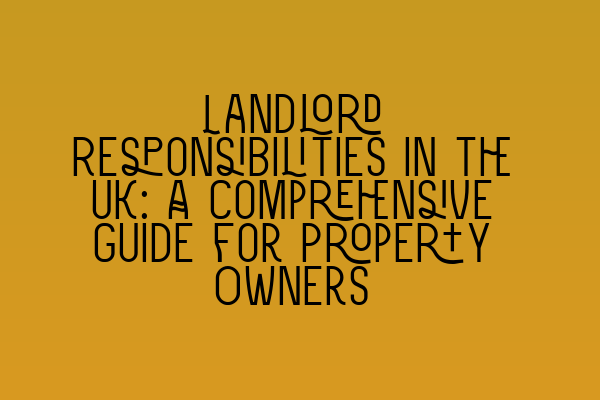Landlord Responsibilities in the UK: A Comprehensive Guide for Property Owners
Being a landlord comes with numerous responsibilities, legal obligations, and considerations. Whether you are a seasoned property owner or just starting out in the rental business, understanding your responsibilities is crucial to ensure a smooth and successful tenancy. In this comprehensive guide, we will explore the key landlord responsibilities in the UK and provide you with the knowledge you need to navigate the rental market.
1. Providing a Safe and Habitability Property
As a landlord, it is your legal duty to provide a safe and habitable property for your tenants. This means ensuring that the property meets all relevant health and safety regulations, including gas and electrical safety standards. Regular inspections and maintenance are essential to identify any potential hazards or defects that may pose a risk to your tenants.
Additionally, it is important to provide adequate heating, ventilation, and hot water systems to ensure the comfort of your tenants. Failure to comply with these requirements may result in legal action being taken against you, so it is essential to prioritize the safety and wellbeing of your tenants.
2. Tenant Screening and Tenancy Agreements
Before entering into a tenancy agreement, it is crucial to conduct thorough tenant screening. This includes verifying their identity, checking their credit history, and obtaining references from previous landlords or employers. Screening tenants helps reduce the risk of problematic tenants and ensures that you choose reliable individuals who are likely to meet their rental obligations.
Once you have selected a suitable tenant, it is essential to have a well-drafted tenancy agreement in place. This legally binding document outlines the rights and responsibilities of both parties and helps prevent disputes in the future. Consider seeking legal advice or using a reputable tenancy agreement template to ensure your agreement is comprehensive and enforceable.
3. Maintenance and Repairs
Maintaining the property is an ongoing responsibility for landlords. Regular inspections should be conducted to identify any maintenance or repair issues promptly. It is important to address these issues in a timely manner to prevent further damage and maintain the property’s habitability.
Depending on the nature of the repair, it may be your responsibility as a landlord to carry out the repairs, or you may need to hire qualified professionals. It is essential to familiarize yourself with the repairing obligations outlined in the Landlord and Tenant Act 1985 to ensure compliance.
4. Rent Collection and Deposit Protection
Collecting rent from your tenants is a fundamental part of being a landlord. It is important to establish a clear method of rent collection and specify the due date and payment method in the tenancy agreement. Consistency is key when it comes to rent collection to avoid confusion and ensure timely payments.
Furthermore, landlords are legally required to protect their tenants’ deposits in a government-approved tenancy deposit scheme. This protects the tenant’s deposit and ensures its fair return at the end of the tenancy, provided there are no damages or rent arrears. Failing to protect the deposit within the required timeframe can result in financial penalties.
5. Dealing with Complaints and Disputes
No matter how well you manage your property, disputes and complaints may still arise. It is essential to have an effective system in place to handle these issues promptly and fairly. Addressing complaints in a timely and professional manner helps maintain a positive landlord-tenant relationship and can prevent the escalation of disputes.
If a dispute cannot be resolved through negotiation, you may need to consider mediation or seeking legal advice. Professional assistance can help protect your rights as a landlord and ensure a fair resolution to the dispute.
By understanding and fulfilling your landlord responsibilities, you can effectively manage your properties and maintain positive relationships with your tenants. Remember, staying informed about changes in legislation and seeking professional advice when needed is key to successful property management.
For further insights into contract law, SQE Property Law & Land Law offers a range of informative articles:
- Misrepresentation in Contracts: Unveiling Deceptive Practices
- A Closer Look at SQE Contract Law Syllabus
- SQE Contract Law: Analyzing Landmark Cases and Influential Judicial Decisions
- Contract Law for Services: Key Considerations and Best Practices
- Understanding Contractual Capacity: Rights and Limitations
